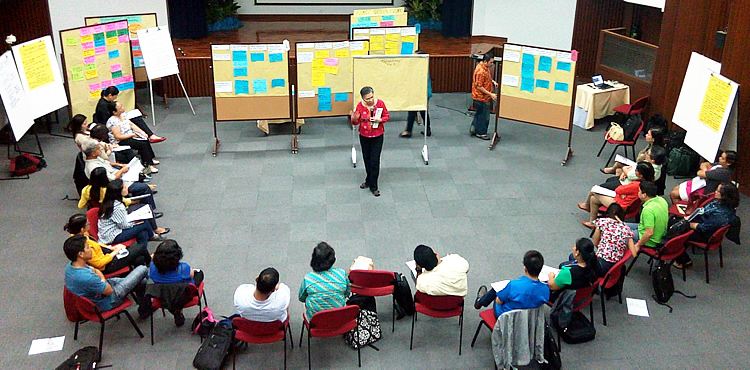Titled Integrating Climate Change Adaptation (CCA) into Policies, Plans and Programs in Agriculture and supported by the DA Systems Wide Climate Change Office (SWCCO), the training-workshop has brought together a mix of various 23 participants from the DA-AMIA teams, DA regional field offices (DA-RFOs), DA-attached agencies and corporations, and DA Central Office.
Agriculture is one of the most vulnerable sectors to climate change in the country as evidenced by the loss of crops brought about by strong typhoons and extreme droughts. Parallel to national efforts, SEARCA has developed with regional partners and universities an Umbrella Program on Climate Change Adaptation and Mitigation in Southeast Asia (CCHAMP) towards an Inclusive and Sustainable Agricultural and Rural Development (ISARD) which includes implementing capacity-building initiatives.
In his opening remarks delivered by Dr. Maria Celeste Cadiz, SEARCA Director Dr. Gil C. Saguiguit Jr. explained that the roll-out of this workshop is actually the sixth training workshop of its kind. He added that before offering this series of training-workshops, previous runs of this module were offered for four ASEAN Technical Working Groups in Agriculture with the support of the ASEAN German Program on Response to Climate Change in Agriculture and Food Security (GAP-CC); as well as for the Philippine agriculture and fishery councils – all with the intent of assisting them in climate-proofing their agricultural and rural development programs.
Meanwhile, Ms. Perla G. Baltazar, representing Dr. Alicia G. Ilaga, DA-SWCCO Director, expressed her hope that the participants’ learning from the training-workshop will be maximized and applied once they go back to their respective offices to accomplish the overall objective of climate change adaptation in the agriculture and fisheries sector.
SEARCA adopted and integrated in the training the modules developed and widely tested by the German Agency for International Cooperation (GIZ) based on the principles set out in the Overseas Economic Cooperation and Development (OECD). The training-workshop focused on four core modules: 1) Identifying the relevance of climate change to a policy, program, plan, or project (Applying a climate lens); 2) Identifying factors contributing to vulnerability in a system (sensitivity, adaptive capacity, exposure to climate signals and potential impacts), and factors that can be improved to reduce vulnerability (Assessing vulnerability); 3) Identifying a range of adaptation options to adjust or improve planning and management under a changing climate (Identifying adaptation options); and 4) Evaluating and prioritizing options using selected criteria (Selecting adaptation measures).
At the end of the workshop, participants will apply the systematic planning steps to real-life climate change-related cases in agriculture which they identified and submitted to the organizers before the actual event in order to develop flagship Climate Change Adaptation initiatives.
 Dr. Felino P. Lansigan, Dean of the UPLB College of Arts and Sciences and member of the prestigious Intergovernmental Panel on Climate Change, delivered an introductory lecture on climate change and climate change adaptation concepts to familiarize the participants with the science of climate change and assist them on proper decision making. On the other hand, Dr. Asa Jose U. Sajise, an environmental economist and associate professor at the UPLB College of Economic and Management, will discuss economic tools in order to asses climate change adaptation options.
Dr. Felino P. Lansigan, Dean of the UPLB College of Arts and Sciences and member of the prestigious Intergovernmental Panel on Climate Change, delivered an introductory lecture on climate change and climate change adaptation concepts to familiarize the participants with the science of climate change and assist them on proper decision making. On the other hand, Dr. Asa Jose U. Sajise, an environmental economist and associate professor at the UPLB College of Economic and Management, will discuss economic tools in order to asses climate change adaptation options.
Dr. Daylinda B. Cabanilla, professor from the UPLB College of Forestry and Natural Resources, serves as the technical coordinator and lead facilitator of the training-workshop; while Ms. Rosario B. Bantayan, SEARCA Program Specialist, serves as the workshop’s co-coordinator. (Kaymart A. Gimutao)
